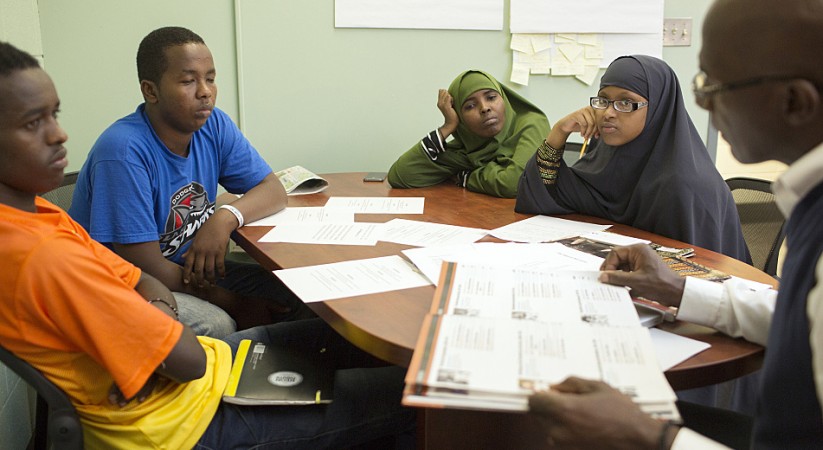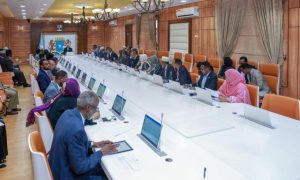
MPRNews | Tuesday August 25, 2015 | Naima Mohamed remembers watching in March as about 100 mostly Somali students, tired of feeling harassed over their race and religion, walked out of St. Cloud Technical High School.
“It was just a lot of pent-up frustration,” said Mohamed, 14, who’ll be a sophomore at Tech High when school returns next week. “People kept how they felt inside and the things that they were going through … they wouldn’t go and talk to someone about it.”
Those simmering tensions boiled over after a Snapchat photo began circulating of a Somali girl that labeled her derisively as a member of the terror group ISIS. About 20 percent of the students at Tech High are Somali. The photo triggered the walkout, spilling the problems into public view.
Since then, the district has been scrambling to address the criticism. It’s added community and school liaison positions, more cultural awareness training for teachers and other moves designed to build closer ties between the school staff and the growing Somali student body.
Somali students haven’t always felt comfortable approaching staff with their problems, said Mohamed, a member of the Student Advocacy Group formed at Tech after the walkout.
“There’s some staff members that aren’t willing to say, ‘Hey, that’s wrong, you shouldn’t say that or do that,'” she said. “I don’t think we’re going to get anywhere if we don’t get the staff members on board.”
District officials say they heard the student concerns clearly.
“Do I believe that there is a problem at Tech? Students were singing that loud and clear. This is how we feel. So, yes, we have a problem there and we need to address it,” said St. Cloud Area Schools Superintendent Willie Jett. “If that’s a student’s perception, that’s reality.”
The district the past few months has created 11 new positions for communications support specialists. Ten of the 11 speak Somali, and they’ll serve in district schools, including Tech, to act as liaisons between the administration and students and their families.
Schools used to have cultural navigators, people who acted as language and cultural translators for the district. But school officials say those jobs were not well defined and didn’t do enough to give students a voice. They hope these new positions will.
“I think a different approach was tried the first time around, and I think when you have an incident, you have to try another approach. The programs that are being implemented right now, will continue to evolve and will look different five years from now, just as they look different than they did five years ago.”
Hentges says he doesn’t believe the culture at Tech is corrosive or racist. But he says that doesn’t mean students don’t have legitimate concerns.
Some aren’t impressed with the changes the district has made, and think they’ll do little more than the changes implemented after the 2011 agreement.
“I don’t see any difference, I don’t think anything has changed,” said Hassan Yussuf, who serves on a school district task force that includes Somali community members.
“The thing is, a small group of people meeting cannot bring enough change,” Yussuf added. “The students are not the problem. The problem is deeper than that. It’s wider than that.”
A group of Somali students at Tech who’ve been meeting since last spring say they think the culture can change. Earlier this month, they made several proposals to the school board, including a peer to peer restorative justice council.
Hentges says the board wants to support the students.
“There’s no question that the school board stands ready to support those students and all of the students at both Tech and Apollo in trying to affect changes and create environments where students of different races are able to interact and get along, which, by the way, they do very well in the vast majority of cases already,” Hentges said.
St. Cloud school officials are trying to give students more of a voice by adding leadership groups at all schools.
Jett said he feels the community pressure to do more. “I want kids to feel good about going to school. I want the students and the families and the parents and the community to trust us and to feel that our schools are the place to be.”
The pressure is also coming from the U.S. Department of Education, which sent officials to the district shortly after the walk-out to conduct interviews and hold a community meeting.
The check-in was part of an agreement the district signed in 2011 to address issues raised by Somali students about harassment at Tech and Apollo, the district’s other high school.
Documents from the feds describe what the district did. It updated entries for harassment and discrimination in the student handbook and school policy, formed student groups, and put up signs throughout district schools.
Students at Apollo have not raised large scale complaints since the agreement was signed.
The U.S. Department of Education did not respond to requests for interviews on how it measured whether those approaches changed anything.
St. Cloud School Board Member Bruce Hentges says the March walk out at Tech doesn’t necessarily indicate that the changes the district made didn’t work.
_____________________________________________________________________________________Xafiiska Wararka Qaranimo Online | Mogadishu, Somalia
_____________________________________________________________________________________Advertisement
_____________________________________________________________________________________









